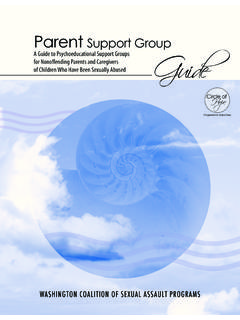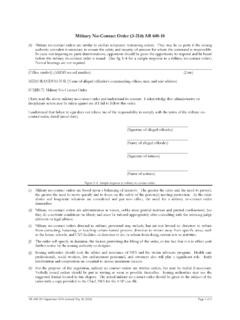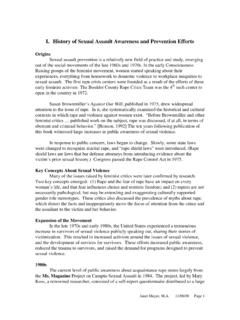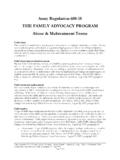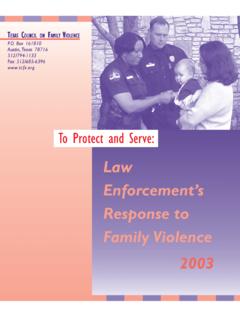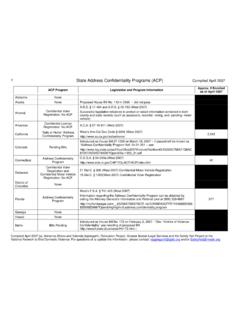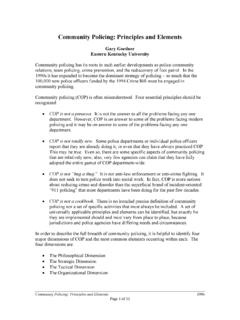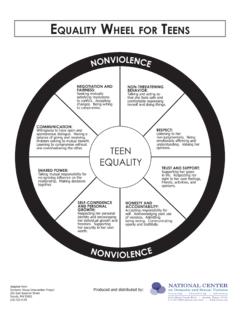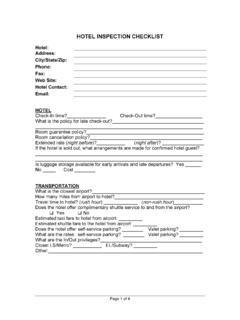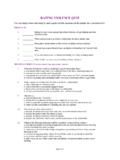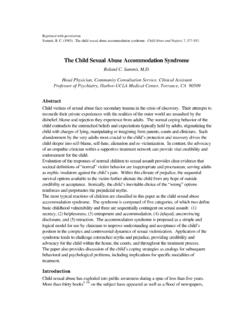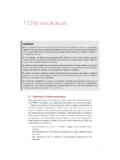Transcription of USING THE CRAWFORD v. WASHINGTON …
1 USING THE CRAWFORD v. WASHINGTON . forfeiture BY wrongdoing confrontation . CLAUSE EXCEPTION IN child abuse CASES. By Tom Harbinson1. INTRODUCTION. In CRAWFORD v. WASHINGTON ,2 the United States Supreme Court held that when an out-of- court statement of an unavailable witness is testimonial, the Sixth Amendment requires the accused be given a prior opportunity to cross-examine the The Court stated it would leave for another day any effort to spell out a comprehensive definition of testimonial. Whatever else the term covers, it applies at a minimum to prior testimony at a preliminary hearing, before a grand jury, or at a former trial; and to police interrogations.
2 4 The Court's use of the term testimonial appears to be directed at use of any statements taken by agents of the government when a reasonably objective person should know they are being taken for possible use in In CRAWFORD , the Court acknowledges a confrontation Clause exception to its new rule on the inadmissibility of testimonial statements given by unavailable As the Court explains, the rule of forfeiture by wrongdoing (which we accept) extinguishes confrontation on essentially equitable grounds 7 CRAWFORD approvingly cites Reynolds v. United States,8 where the Court first applied the forfeiture by wrongdoing The Reynolds Court held, The Constitution does not guarantee an accused person against the legitimate consequences of his acts.
3 It grants him the privilege of being confronted with the witnesses against him; but if he voluntarily keeps the witnesses away, he cannot insist on his privilege. 10 The exception is based on the maxim that no one should be permitted to take advantage of his own 1. Senior Attorney, National child Protection Training Center (at Winona State University, Winona MN). 2. 2004 Lexis 1838 (March 8th, 2004). 3. Id. at 14. 4. Id. 5. See id. at 27-30. 6. See id. at 42. 7. Id. 8. 484 145 (1878). 9. CRAWFORD at 42. 10. Reynolds at 158. 11. Id. at 159. CRAWFORD 's approval of the forfeiture by wrongdoing exception should allow prosecutors to get a significant number of out-of-court statements of unavailable witnesses admitted.
4 It is common in child abuse cases for the suspect to procure the child 's unavailability to testify, whether by telling the child not to tell,12 by threats against the child ,13 the family,14 or even pets,15 or through use of others, such as family The abuser's use of secrecy is intended to prevent the child from initially disclosing and testifying against the Since Reynolds, the Supreme Court appears to have expanded the exception to allow admission of uncross-examined depositions not made under oath, if the witness was absent from the trial by suggestion, procurement, or act of the accused, Motes v.
5 United States,18 and admission of other extrajudicial statements based on the defendant's TESTIMONIAL STATEMENTS ARE ADMISSIBLE. IF THE ACCUSED PROCURES THE child 'S UNAVAILABILITY. Since CRAWFORD does not give a comprehensive definition of testimonial statements, prosecutors should argue child abuse videotapes and out-of-court statements by children are not testimonial. 20 Even if child abuse videotaped statements and other out-of-court statements are considered testimonial, the equivalent of uncross-examined depositions not taken under oath, these statements are admissible when the child 's unavailability occurs due to procurement by the accused.
6 Courts have held procurement includes persuasion and suggestion, the wrongful disclosure of information, control by the suspect, 12. John R. Conte, ed., CRITICAL ISSUES IN child SEXUAL abuse 118 (2002) (27% of child abuse victims warned not to reveal the abuse ). 13. See State v. Bewley, 68 613, 616 (Mo. 2002) (defendant told boy he would kill him if he refused to submit to sex or told anyone). 14. See State v. Naucke, 829 2d 445, 448-449 (Mo. 1992) (four year old sodomy victim told she and her mother would be killed if she told about abuse ). 15. See State v. Twist, 528 1250, 1254-1255 (Me.)
7 1987) (grandfather killed children's cat by burning it in oven and told children he would shoot them if they told about sexual abuse ). 16. See People v. Guce, 560 53, 56 ( App. 1990) (six and eight year old sexual abuse victims told by mother they would be responsible for father's incarceration and dissolution of family if they cooperated with prosecutor). 17. See People v. Brocklin, 687 1119, 1120 (Ill. App. 3d 1997) (grandfather told four year old sodomy victim not to tell about their secret ). See also R. Summit, The child Sexual abuse Accommodation Syndrome, 7 child abuse and Neglect 177 (1983).
8 18. 178 458, 471 (1900) (this interpretation is implied as the Court's holding was un-cross examined depositions not taken under oath would violate confrontation unless procurement occurred). 19. See Diaz v United States, 223 442, 452 (1912). 20. These statements should not be considered testimonial because they are not specifically prepared for court, young children are unlikely to comprehend the statement could be used at trial, or in court. See Victor I Vieth, Keeping the Balance True: Admitting child Hearsay in the Wake of CRAWFORD v. WASHINGTON , UPDATE, Vol. 16 No. 12 (2004). asking others to persuade the witness not to testify, and acquiescence in others performing acts of procurement.
9 21. Prosecutors must use the Motes' language or act of the accused, 22 to argue for the forfeiture by wrongdoing exception to include as many acts as possible. The act that constitutes the procurement, by itself, need not be wrongful or a threat. Things the child could view as being beneficial, such as gifts or money, should constitute procurement if they result in the child being ACTS DURING THE CRIME SHOULD BE USED TO SHOW PROCUREMENT. Can the suspect's procurement made during the crime be used in applying the forfeiture by wrongdoing exception, or does the exception only apply to procurement made after the crime?
10 The critical wrongdoing the exception attempts to prevent is not based on when the act occurs, but whether the act caused a witness to be unavailable. Thus, the question should be was the accused's act responsible for the witness being unavailable to testify?24. Although the United States Supreme Court has not ruled on whether the exception applies to procurement made during the crime, the rationale behind the rule supports doing so. In a seminal decision, New Jersey v. Sheppard,25 a ten-year-old girl stated her stepfather told her, during the time sexual abuse was occurring, he would kill her if she revealed the abuse .
